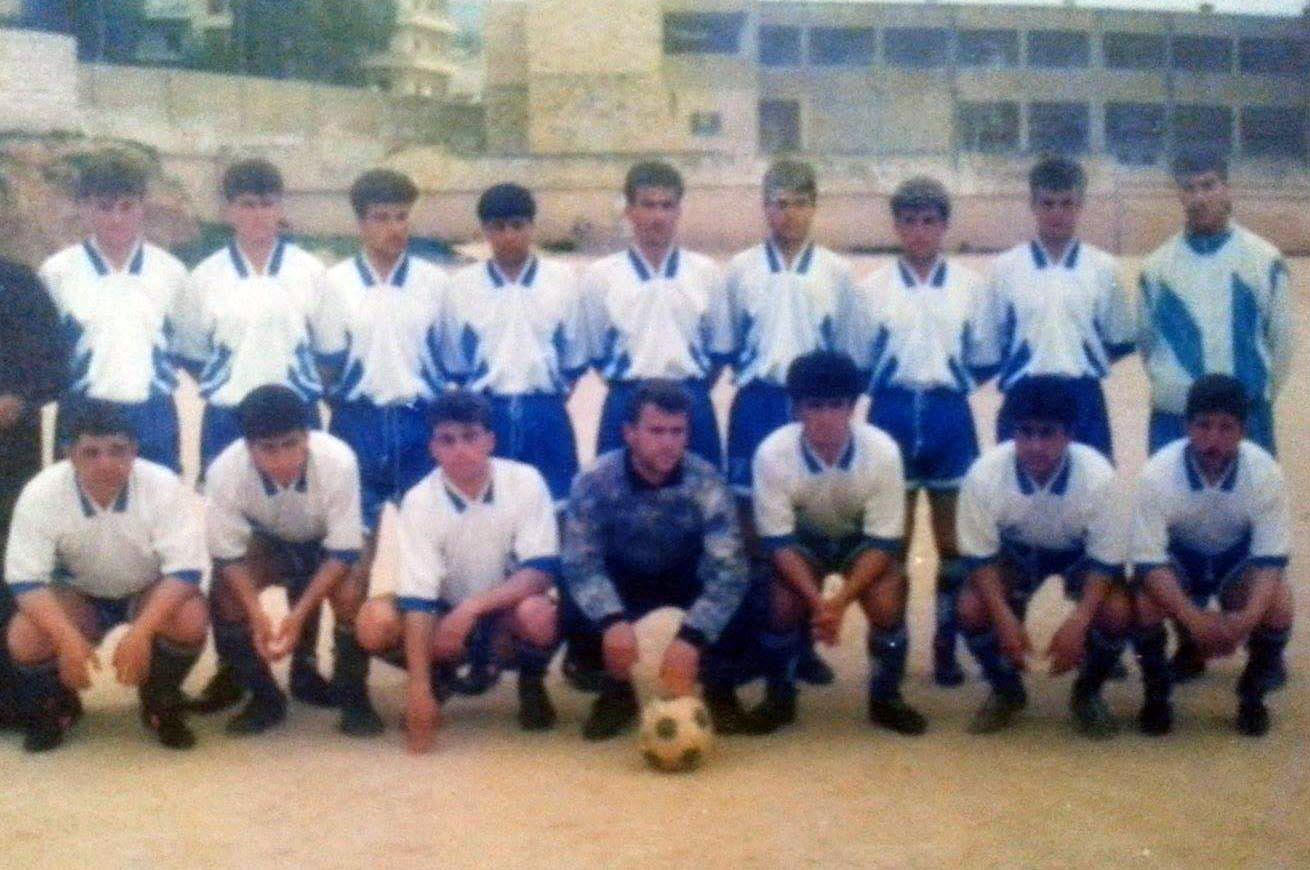Friends Divided By the Syrian Uprising

Two men brought together by their passion for football have taken opposing sides in the armed conflict.
Mustapha al-Jalal
(Kfar Nabel – Syria) Since the start of the Syrian uprising in March 2011, the friendship Abu Steif and I shared for years has never been the same.
At 51, Abu Steif is one year older than me. We both have degrees in physical education. He is a cultured man, one of the leading calligraphers in the region, and a successful cartoonist. We first met through our mutual love of sport, particularly football.
We had worked at the sports club in Kfar Nabel together since it was founded in 1991 until the end of the summer of 2010. We experienced the club’s victories and defeats together and did not leave each other’s side for over thirty years.
But when the anti-government protests began in Syria in 2011 our political differences came to the surface.
Abu Steif was bent on supporting the regime as it suppressed what were then-peaceful protests. I was fully behind the protestors and their demands for freedom and dignity.
At first, our difference in opinion did not matter because we both respected the principles of democracy and freedom of speech. But when the regime forces occupied the city of Kfar Nabel on July 4 2011 and when the Syrian Army fired the first shot at peaceful protestors it marked the beginning of the end of our relationship.For me, the bloodshed was the final straw.
Before the regime forces entered the city, Abu Steif had advised me that I should not participate in the anti-government demonstrations if I wanted to keep my monthly salary.
He said I should wait to see how the initial protests turned out and then decide whether or not I wanted to join them.
He also reminded me that we were both members of the ruling Baath party and that I had a duty to the party as secretary of its youth wing.
But I stuck to my position of being staunchly opposed to the criminal regime even though Abu Steif tried to persuade me otherwise. I told him that I knew exactly what I was doing when I participated in the peaceful revolutionary movement.
I knew that the first thing they would do is stop paying my salary, which was all I had. After that, I continued to take part in all the peaceful action in Kfar Nabel, from the demonstrations, to giving emergency aid to areas such as Jisr Al-Shaghour and Khan Shaykoun that had been invaded by the regime army and whose residents had been besieged and displaced.
Abu Steif stubbornly held onto his pro-regime stance, refusing to even attend the funerals of the city’s martyrs or offer condolences to their families.
The likely reason for his position was his family, and particularly his wife. She stopped him watching any television stations that broadcast news of the revolutionary movement.
He was also afraid of losing his state income, even though the money he makes as a calligrapher is more than sufficient to support him and his family.
I know of no other reason why he would support the regime since no interest or goal can justify it.
I also know that he is incapable of harming another human being. I know what a kind man he is. He used to be loved by everyone in the city. I am confused as to why he maintains this position and I ask myself how long he will stick to it.
Our mutual friends shared my view on Abu Steif. I still meet with them every day as if nothing has happened but Abu Steif doesn’t come along. I no longer count him among my friends. For me, these things are black or white. There are no shades of grey. I take them very seriously because there can be no ambiguity.
Abu Steif tried to resolve things by asking my father to put pressure on me, but he still insisted on supporting the regime against the revolution. He did not even become neutral.
He tried to tell me that the rumours about his relationship with the regime army that was occupying the city were not true.
Revolutionaries eventually burned down Abu Steif’s house during the battle for the liberation of the city.
By chance, we ran into each other a year after the uprising began.
On that occasion he criticized the placards that the demonstrators were carrying.
He made fun of the quality of the colours, the likeness of the figures, and the professionalism of the artists. I couldn’t stop myself and I cut him off sternly.
“Why were you not the artist adopted by the revolutionary movement? Why weren’t your illustrations held up?” I asked him. At this, he went quiet and left.
After the education ministry stopped paying me my salary in 2014 my hatred of the regime grew even deeper. Meanwhile, Abu Steif continued to support it despite the many shells and missiles that the Syrian Army dropped near his house.
It was as though the spilt blood, martyrs, and the innocent people detained did not make any difference to him.
Because Abu Steif was like a brother to me, I rushed to offer him my condolences when he lost his sick mother at the beginning of the summer of 2014. It was my religious, moral, and human obligation to do so and I did so despite the fact that he did not attempt to comfort me, as other friends did, when I lost my income.
I still feel love and affection towards him and I am ready to restore our relationship to what it once was as soon as he genuinely changes his position towards the regime. I hope he finds the right path.

